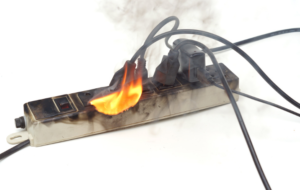Fires can happen pretty much anywhere but are particularly common in the workplace. In the UK, there are approximately 16,000 non-residential fires reported each year, and a large proportion of these are found to take place at work.
While the cause of these fires can be for any number of reasons, the vast majority of cases simply come down to human negligence and a lack of care and attention. Therefore, to keep businesses protected, it is important to pay particularly close attention to specific areas of the office known to cause a potential fire risk.
From waste bins to plug sockets, unless you have effective countermeasures like fire doors, extinguishers or concrete barriers in place, you could be putting your office at risk. Listed below are some of the most common workplace fire hazards that you should keep an eye on, to minimise the risk of fire.
Overloaded plug sockets
 If you work in an office, you are going to be using a lot of electrical appliances. Whether it be the computer on your desk or the kettle in the kitchen, most common workplaces use electricity to function and rely on a ton of appliances plugged into the wall.
If you work in an office, you are going to be using a lot of electrical appliances. Whether it be the computer on your desk or the kettle in the kitchen, most common workplaces use electricity to function and rely on a ton of appliances plugged into the wall.
However, overloading these plug sockets can be a fairly common cause of electrical fires, and can be easily avoided by taking the time to look at your current setup. If you are using faulty extension leads or have stuffed too many appliances into the same plug socket, you can increase the potential fire risk due to overheating.
Where possible, try to only use one plug in each socket and avoid using appliances which require 13 amps across the whole socket.
Faulty electrical equipment
While on the topic of electricity, it isn’t just overloading the plug sockets you need to watch out for. If the electrical equipment you use at the office is faulty or dangerous, this can substantially heighten the risk of an electrical fire.
In order to prevent this, it is important to have a qualified electrician come around to regularly PAT test whether your equipment is still safe to use. It is also important to keep an extra eye out for any signs of loose cables or damaged plugs, and to replace any equipment found to be faulty.
Waste and combustible materials
While the workplace is slowly becoming more and more paper-free, many offices around the globe still see build-ups of paper, cardboard and other combustible materials. Without the regular disposal of these materials, they can provide plenty of fuel for any potential fires that break out.
For example, if a smoker in your office haphazardly discards a cigarette onto a pile of this material, this could result in a fire which can burn and spread rapidly. Therefore, try to avoid storing rubbish on site or make sure to keep it in a designated area away from the main building.
Smoking
If you work with smokers, or you smoke yourself, make sure to dispose of your cigarettes properly and avoid smoking around potentially flammable materials. Your workplace should provide you with special bins to dispose of your used cigarettes, so use these to avoid starting an accidental fire.
Don’t just flick used cigarettes on the ground or stamp them out thinking that will do the job – take the time to dispose of them correctly. Also, avoid smoking indoors and, if you have one, make use of the designated smoking area at your workplace.
Humans
Perhaps the biggest cause of fires in the workplace comes simply through human error. Whether it be using equipment incorrectly, causing accidents or leaving cooking unattended, there are several ways in which employee negligence could lead to a fire.
While you can’t remove human error from the workplace completely, there are certain things you can do to limit it having an effect. For example, training staff properly and providing them with advice on the best practices for fire safety is vital.
Likewise, teaching employees what to do if the worst happens and a fire does start is important to ensuring its kept under control and damage is kept to a minimum. All staff should be trained to use the correct type of fire extinguisher, as using one incorrectly could only make things worse.
Fire Safety in 2023 eBook
SHP's sister site, IFSEC Insider has released its annual Fire Safety Report for 2023, keeping you up to date with the biggest news and prosecution stories from around the industry.
Chapters include important updates such as the Fire Safety (England) Regulations 2022 and an overview of the new British Standard for the digital management of fire safety information.
Plus, explore the growing risks of lithium-ion battery fires and hear from experts in disability evacuation and social housing.


